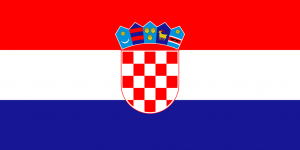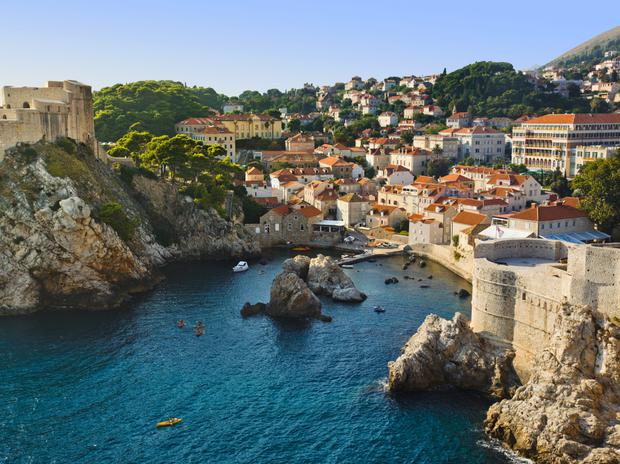Language/Croatian/Culture/Croatia-Timeline
Jump to navigation
Jump to search
Rate this lesson:
Historical Timeline for Croatia - A chronology of key events
Croatia Timeline[edit | edit source]
- 900-800 BC ➡ Arrival of the Illyrians on current Croatian territory.
- 500-400 BC ➡ Arrival of the Greeks and Celts.
- 229 BC ➡ Beginning of Roman domination.
- 285 ➡ The Roman emperor Diocletian has the fortified palace of Split built.
- 600-650 ➡ Coming from the northeast, the Croats settle.
- 812 ➡ Treaty of Aix-la-Chapelle which divides the territory into three duchies.
- 925 ➡ Coronation of Tomislav, first Croatian king, who reunites the kingdom.
- 1102 ➡ Union of Croatia and Hungary.
- 1202 ➡ Zadar and Dubrovnik are invaded by the Venetians.
- 1301 ➡ The Anjous on the Hungarian-Croatian throne.
- 1358 ➡ Defeat of the Venetians against Charles d'Anjou. Dalmatia is attached to the crown.
- 1493 ➡ Defeat of the Croatian armies before the Turks who settle on the territory. While Venice redeems the rest of the territory.
- 1527 ➡ Coronation of Ferdinand I of Habsburg who thus accedes to the Croatian throne.
- 1664-1669 ➡ Under the threat of an insurrection, the Habsburgs call in the French troops for reinforcement.
- 1667 ➡ An earthquake destroys Dubrovnik.
- 1699 ➡ Croatia reconquers Slavonia, then in the hands of the Ottomans.
- 1797 ➡ Fall of the Republic of Venice. Dalmatia and Istria return to Austria.
- 1809-1815 ➡ Napoleon seizes the Illyrian provinces, from which he is dispossessed a little later.
- 1848 ➡ "The Croatian Renaissance": influenced by the French Revolution, Croatian intellectuals begin to awaken a national feeling among Croatian peasants until then strongly Germanized and Italianized.
- 1908 ➡ Austria-Hungary annexes Bosnia-Herzegovina and at the same time thwarts the expansionist aims of Serbia with regard to this province.
- 1914 ➡ The Sarajevo attack, perpetrated against Crown Prince Franz Ferdinand by the young Serbian nationalist Gavrilo Princip, starts the First World War.
- 1915-1918 ➡ In exile, Slovenian, Croatian and Serbian politicians found the Yugoslav Committee with a view to the creation of a common Yugoslav state, created in 1918.
- 1920 ➡ The Treaty of Rapallo allocates important Croatian territories to Italy: Istria, Zadar and its surroundings, the islands of Cres, Lošinj and Lastovo.
- April 1941 ➡ German invasion of Yugoslavia and establishment of an Ustasha government in Croatia - first Croatian government under the leadership of Ante Pavelić in collaboration with the fascists.
- 1945 ➡ Croatia, ruled by Tito, becomes a Federal Republic of the Federal People's Republic of Yugoslavia, proclaimed in 1946.
- 1971 ➡ "Croatian Spring": in reaction to the strong Serbian domination within the Federal People's Republic of Yugoslavia, Croatian intellectuals demanded the formation of a more autonomous Croatian republic within the framework of the People's Republic. Tito brutally put an end to this movement, following a series of general strikes by workers and students.
- 1980 ➡ On May 4, death of Josip Broz, known as Tito.
- 1988-1990 ➡ Slobodan Milošević's seizure of power in Serbia marks the beginning of the battle for the realization of a Greater Serbia. With a real putsch, Milošević abolished the autonomy of Kosovo and Vojvodina and placed his supporters at the head of Montenegro. The Serbian bloc thus paralyzes the functioning of the Yugoslav collegiate presidency by controlling half of the eight representatives. In 1990, Franjo Tuđman, head of the Croatian Democratic Community, was elected.
- 1991 ➡ Croatia declares its independence. From the spring of 1991, rebellions of Serbian terrorists in Croatia supported by the Yugoslav army, which has become the Serbian army (regions of Lika, Kordun, Banija and in eastern Slavonia). Summer 1991, start of the war against the Yugoslav armies in Croatia. A quarter of the country falls into Serbian hands. In October, bombardment of Dubrovnik. In November, fall of Vukovar. Serbia is sanctioned by the European Community. In December, recognition of Croatian independence by members of the EU (the Vatican first).
- 1992 ➡ In the summer of 1992, Croatia joined the UN.
- 1995 ➡ Signature of the Dayton peace accords in the United States. The conflict has left nearly 15,000 dead and 50,000 injured.
- 1997 ➡ Re-election of Franjo Tuđman.
- 1998 ➡ Croatia climbs to third place on the podium at the FIFA World Cup after losing in the semi-finals to the French team.
- 1999 ➡ NATO starts the "war in Kosovo". Milošević is indicted for crimes against humanity by the International Criminal Tribunal. Death of Franjo Tuđman.
- January 2000 ➡ Victory for the opposition coalition in the legislative elections.
- February 2000 ➡ Stjepan Mesić is elected President of the Republic of Croatia.
- 2001 ➡ Cooperation agreement with the European Union.
- 2002 ➡ Croatia is a candidate to join NATO.
- October 2003 ➡ Zagreb submits the membership evaluation questionnaire to the European Commission.
- Summer 2004 ➡ The French discover Croatia and arrive in droves on its beacheses. Active resumption of tourism in Croatia.
- January 2005 ➡ Re-election of Stjepan Mesić.
- 2007 ➡ Re-election of Ivo Sanader, Prime Minister for a four-year term.
- June-July 2009 ➡ Prime Minister Ivo Sanader leaves his post, Jadranka Kosor succeeds him and becomes the first woman Prime Minister in Croatia.
- 2009 ➡ Croatia on the way to joining the European Union. Establishment of an organigram of state structures for accession negotiations.
- 2010 ➡ Ivo Josipović is elected President of the Republic of Croatia; continuation of negotiations for entry into the EU.
- 2011 ➡ Ante Godovina, Croatian general accused of crimes against humanity, is sentenced by the International Criminal Court. Yet he is considered a war hero in his country.
- Croatia's accession to the European Union is the national priority. The accession treaty was signed on December 9 in Brussels.
- 2012 ➡ Referendum on membership on January 22, 2012, with 66% of the votes cast in favor of membership.
- 2013 ➡ Jadranko Prlic, former president of the Bosnian Croats, sentenced to 25 years in prison by the ICTY, for political and military submission of Bosnian Muslims and other non-Croats in Herceg-Bosna.
- July 1, 2013 ➡ Croatia joins the European Union. 28th Member State, it has 12 members of the European Parliament.
- 2014 ➡ European elections of May 25. The 25% of Croatian voters elected 11 MEPs.
- January 11, 2015 ➡ Presidential elections. Conservative Kolinda Grabar Kitarovic, who beats Ivo Josipović with 50.74% of the vote, is elected head of the Government. Zoran Milanović has been Prime Minister since December 23, 2011.
- January 22, 2016 ➡ The President appoints her new Prime Minister, Tihomir Orešković, a businessman who did not belong to any political party before.
- June 16, 2016 ➡ The Diet having adopted a motion of censure (125 votes in favor, 15 against and 2 abstentions) and less than five months after Prime Minister Tihomir Orešković took office, his cabinet was overthrown.
- October 19, 2016 ➡ Orešković is replaced by a new Conservative Prime Minister, Andrej Plenković. This forms the 14th government, formed and supported by a center-right coalition between the Croatian Democratic Union (HDZ) and the Bridge of Independent Lists (Most).
- May-June 2017 ➡ Andrej Plenković first governed in coalition with the conservative Most party. In a context marked by the beginnings of the crisis of the agri-food giant Agrokor (15% of Croatian GDP), the HDZ wins the local elections and changes government coalition partner, by opening up to the HNS (center left). 2018 ➡ Plenković government benefits from economic upturn and tourism boom. However, since the spring of 2017, he has been confronted with the management of the financial bankruptcy of the agri-food giant Agrokor, with its repercussions on economic and political life. In this complex internal context, the Plenković government is in constant search of political balance between its most conservative wing and its declared objectives, such as the reform of national education for example. In July, the Croatian football team climbed to the final of the World Cup after a good run, but was beaten by France.
Sources[edit | edit source]
World Timelines[edit source]
Videos[edit | edit source]
Origins of Croats, Croatian culture and Croatian checkerboard ...[edit | edit source]
Croatian Stories - YouTube[edit | edit source]


